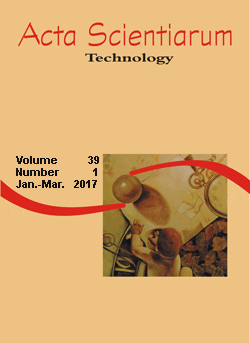<b>Lipase from <i>Aspergillus niger</i> obtained from mangaba residue fermentation: biochemical characterization of free and immobilized enzymes on a sol-gel matrix
DOI:
https://doi.org/10.4025/actascitechnol.v39i1.29887Palavras-chave:
fruit residue, sol-gel, biotechnology, enzymeResumo
 In this study, mangaba residue (seeds) was used as a substrate for Aspergillus niger lipase production by solid-state fermentation. The partially purified enzyme was efficiently immobilized in a sol-gel matrix by covalent bonding with an immobilization yield of 91.2%. The immobilized biocatalyst and free lipase had an optimum pH of 2.0 and 5.0, respectively. However, greater stability was obtained at pH 4.0 and 7.0, respectively. The biocatalysts showed stability at the optimum temperature of 55°C, where the residual activity was above 87% after 240 min., of incubation. The lower deactivation constant (kd) and higher half-life of the immobilized biocatalyst indicated greater thermal stability than those obtained with the free enzyme. The Michaelis Constant (Km) (77 and 115 mM for free and immobilized lipase, respectively) and maximum reaction rate (Vmax) (1250 and 714 U mg-1 for free and immobilized lipase, respectively) indicated that the immobilization process reduced enzyme-substrate affinity. Regarding the operational stability, the biocatalyst showed relative activity above 50% until seven cycles of reuse in olive oil hydrolysis. This novel biocatalyst obtained from a tropical fruit residue showed biochemical characteristics that support its application in future biocatalysis studies.
Â
Â
Downloads
Downloads
Publicado
Como Citar
Edição
Seção
Licença
DECLARAÇíO DE ORIGINALIDADE E DIREITOS AUTORAIS
Declaro que o presente artigo é original, não tendo sido submetido í publicação em qualquer outro periódico nacional ou internacional, quer seja em parte ou em sua totalidade.
Os direitos autorais pertencem exclusivamente aos autores. Os direitos de licenciamento utilizados pelo periódico é a licença Creative Commons Attribution 4.0 (CC BY 4.0): são permitidos o compartilhamento (cópia e distribuição do material em qualqer meio ou formato) e adaptação (remix, transformação e criação de material a partir do conteúdo assim licenciado para quaisquer fins, inclusive comerciais.
Recomenda-se a leitura desse link para maiores informações sobre o tema: fornecimento de créditos e referências de forma correta, entre outros detalhes cruciais para uso adequado do material licenciado.



















